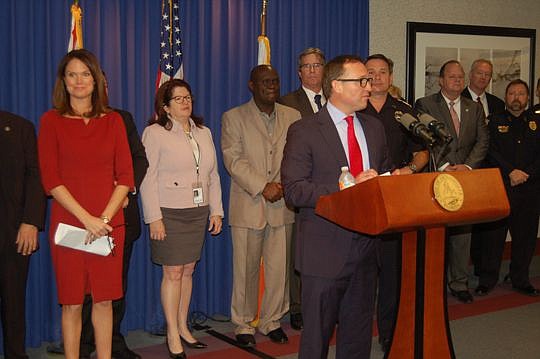
Mayor Lenny Curry has a message for anyone in Jacksonville who decides to fire a gun while breaking the law.
“If you are stupid enough to commit a crime in our city — specifically with a gun — we’re coming after you,” he said Wednesday.
Joined at a news conference by State Attorney Melissa Nelson, Sheriff Mike Williams, representatives of state and federal law enforcement agencies and City Council members, Curry said he’s asking council to fast-track legislation to appropriate $250,000 for a bullet identification system.
The National Integrated Ballistic Information Network is a database of digital images of spent bullets and cartridge cases collected at crime scenes or test-fired from confiscated or recovered weapons.
The system identifies the unique markings made on a bullet and cartridge when a gun is fired and allows that data to be shared and compared with evidence gathered by other law enforcement agencies.
The system is managed by the federal Bureau of Alcohol, Tobacco, Firearms and Explosives and has been shown in other cities to accelerate apprehension of suspects and aid prosecution.
According to ATF, it is the only interstate, automated ballistic imaging network in the U.S. and is available at more than 150 sites.
Nelson said her office uses bullet and shell casing evidence that’s processed by the Florida Department of Law Enforcement, but due to the state lab’s workload, the amount of time needed for evidence to be evaluated can slow down the legal process.
It can take more than 12 months for the state lab to provide the data the network can provide in a matter of days, sometimes within 48 hours, she added.
“The value to us is timeliness. Every day matters,” Nelson said.
Williams said having the system in his department would enhance the work being done through partnerships with federal law enforcement, including ATF, the FBI, the Drug Enforcement Administration and the U.S. Marshals Service.
The network “is the last piece of the puzzle,” the sheriff said.
It has been used in Denver since 2013. In the past four years, that city’s Gun Crime Intelligence Center has achieved a 30 percent reduction in homicides and identified 23 defendants suspected in 33 shootings, according to a report by ATF.
Curry, Nelson and Williams will go to Denver in April to see how police there use the technology and how its use was integrated into the department.
Council committees will be asked to review and approve the appropriation when they meet next week.
The bill could come up for a vote by the council as a whole on Feb. 28.
(904) 356-2466